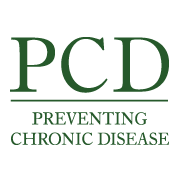PCD News Summary for March 9, 2017

About the Journal
Published every Thursday, Preventing Chronic Disease (PCD) is a peer-reviewed online journal established by CDC’s National Center for Chronic Disease Prevention and Health Promotion. The News Media Branch prepares press summary packets each week. To receive these press summaries on an embargoed basis, send an e-mail to media@cdc.gov. Please note that this e-mail list is for credentialed journalists only. All others, please visit Hookup to Health to sign up for e-mail updates
Notice to News Media - PCD Release Time and Embargo Policy:
CDC’s News Media Branch releases to reporters the PCD media packet every Tuesday afternoon between 12 and 2 pm.
Embargoed until Thursday, March 9, at 12:00 PM ET
Cardiometabolic Risk Factors Among 1.3 Million Adults With Overweight or Obesity, but Not Diabetes, in 10 Geographically Diverse Regions of the United States, 2012–2013
Melissa Newton
mnewton@cdc.gov
404-718-6281
A small minority of overweight and obese people have none of the traditional risk factors that usually predict diabetes and heart disease. Researchers found that among the 1.3 million overweight and obese people studied, 14 percent had normal blood sugar, cholesterol, and blood pressure measurements. Some experts have dubbed these people “metabolically healthy obese,” but that term may be misleading because, while these people may be less likely than other obese people to develop heart disease and diabetes, they remain at higher risk than people of normal weight. In addition, they have a higher risk of developing other diseases and of dying earlier than people who are not obese.This study is one of the largest to date to quantify the number of obese people without these risk factors. Researchers say they don’t fully understand why some obese people do not develop diabetes or heart disease and that better prevention and treatment strategies are needed.
###
Note: Not all articles published in PCD represent work done at CDC. In your stories, please clarify whether a study was conducted by CDC (“a CDC study”) or by another institution (“a study published by CDC”). The opinions expressed by authors contributing to PCD do not necessarily reflect the opinions of CDC or the institutions with which the authors are affiliated. PCD requests that, when possible, you include a live link to the article in your stories.
###
U.S. DEPARTMENT OF HEALTH AND HUMAN SERVICES
CDC works 24/7 protecting America’s health, safety and security. Whether diseases start at home or abroad, are curable or preventable, chronic or acute, stem from human error or deliberate attack, CDC is committed to respond to America’s most pressing health challenges.
- Page last reviewed: March 9, 2017
- Page last updated: March 9, 2017
- Content source:
Error processing SSI file


 ShareCompartir
ShareCompartir